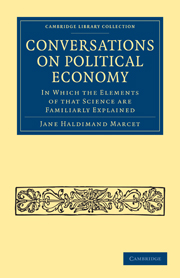Book contents
- Frontmatter
- PREFACE
- Contents
- CONVERSATION I INTRODUCTION
- CONVERSATION II INTRODUCTION—continued
- CONVERSATION III ON PROPERTY
- CONVERSATION IV PROPERTY—continued
- CONVERSATION V ON THE DIVISION OF LABOUR
- CONVERSATION VI ON CAPITAL
- CONVERSATION VII CAPITAL—continued
- CONVERSATION VIII ON WAGES AND POPULATION
- CONVERSATION IX WAGES AND POPULATION—continued
- CONVERSATION X ON THE CONDITION OF THE POOR
- CONVERSATION XI ON REVENUE
- CONVERSATION XII REVENUE FROM LANDED PROPERTY
- CONVERSATION XIII REVENUE FROM THE CULTIVATION OF LAND
- CONVERSATION XIV REVENUE FROM CAPITAL LENT
- CONVERSATION XV ON VALUE AND PRICE
- CONVERSATION XVI ON MONEY
- CONVERSATION XVII MONEY—continued
- CONVERSATION XVIII COMMERCE
- CONVERSATION XIX ON FOREIGN TRADE
- CONVERSATION XX FOREIGN TRADE—cont.
- CONVERSATION XXI ON EXPENDITURE
- INDEX
CONVERSATION XVI - ON MONEY
Published online by Cambridge University Press: 07 September 2011
- Frontmatter
- PREFACE
- Contents
- CONVERSATION I INTRODUCTION
- CONVERSATION II INTRODUCTION—continued
- CONVERSATION III ON PROPERTY
- CONVERSATION IV PROPERTY—continued
- CONVERSATION V ON THE DIVISION OF LABOUR
- CONVERSATION VI ON CAPITAL
- CONVERSATION VII CAPITAL—continued
- CONVERSATION VIII ON WAGES AND POPULATION
- CONVERSATION IX WAGES AND POPULATION—continued
- CONVERSATION X ON THE CONDITION OF THE POOR
- CONVERSATION XI ON REVENUE
- CONVERSATION XII REVENUE FROM LANDED PROPERTY
- CONVERSATION XIII REVENUE FROM THE CULTIVATION OF LAND
- CONVERSATION XIV REVENUE FROM CAPITAL LENT
- CONVERSATION XV ON VALUE AND PRICE
- CONVERSATION XVI ON MONEY
- CONVERSATION XVII MONEY—continued
- CONVERSATION XVIII COMMERCE
- CONVERSATION XIX ON FOREIGN TRADE
- CONVERSATION XX FOREIGN TRADE—cont.
- CONVERSATION XXI ON EXPENDITURE
- INDEX
Summary
MRS. B
HAVING obtained some knowledge of the nature of value, we may now proceed to examine the use of money.
Without this general medium of exchange, trade could never have made any considerable progress; for as the subdivisions of labour increased, insuperable difficulties would be experienced in the adjustment of accounts. The butcher perhaps would want bread, at a time that the baker did not want meat; or they might each be desirous of exchanging their respective commodities, but these might not be of equal value.
CAROLINE
It would be very difficult, I believe, at any time to make such reckonings exactly balance each other.
MRS. B
In order to avoid this inconvenience, it became necessary for every man to be provided with a commodity which would be willingly taken at all times in exchange for goods. Hence arose that useful representative of commodities, money, which, being exclusively appropriated to exchanges, every one was ready either to receive or to part with for that purpose.
CAROLINE
When the baker did not want meat he would take the butcher's money in exchange for his bread, because that money would enable him to obtain from others what he did want.
MRS. B
Various commodities have been employed to answer the purpose of money. Mr. Salt, in his Travels in Abyssinia, informs us, that wedges of salt are used in that country for small currency, coined money being extremely scarce. A wedge of rock-salt, weighing between two and three pounds, was estimated at 1-30th of a dollar.
- Type
- Chapter
- Information
- Conversations on Political EconomyIn Which the Elements of that Science are Familiarly Explained, pp. 293 - 317Publisher: Cambridge University PressPrint publication year: 2010First published in: 1816

